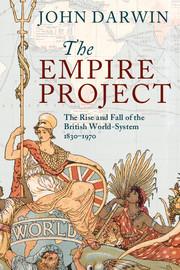Book contents
- Frontmatter
- Contents
- List of maps
- Preface and acknowledgments
- Introduction: the project of an Empire
- Part I Towards ‘The Sceptre of the World’: the elements of Empire in the long nineteenth century
- 1 Victorian origins
- 2 The octopus power
- 3 The commercial republic
- 4 The Britannic experiment
- 5 ‘Un-British rule’ in ‘Anglo-India’
- 6 The weakest link: Britain in South Africa
- 7 The Edwardian transition
- Part II ‘The great liner is sinking’: the British world-system in the age of war
- Conclusion
- Notes
- Select bibliography
- Index
5 - ‘Un-British rule’ in ‘Anglo-India’
Published online by Cambridge University Press: 11 December 2009
- Frontmatter
- Contents
- List of maps
- Preface and acknowledgments
- Introduction: the project of an Empire
- Part I Towards ‘The Sceptre of the World’: the elements of Empire in the long nineteenth century
- 1 Victorian origins
- 2 The octopus power
- 3 The commercial republic
- 4 The Britannic experiment
- 5 ‘Un-British rule’ in ‘Anglo-India’
- 6 The weakest link: Britain in South Africa
- 7 The Edwardian transition
- Part II ‘The great liner is sinking’: the British world-system in the age of war
- Conclusion
- Notes
- Select bibliography
- Index
Summary
British rule in India had always been an awkward compromise between principle and practice. The early Victorians had declared that the purpose of the Company Raj was the political education of Indians and their preparation for eventual self-government. Fifty years on, progress towards this goal was barely perceptible. At the end of Company rule in 1858, the Queen's Proclamation had reassured Indians that race discrimination would play no part in the new colonial regime. But this was hard to square with the status of even educated Indians in the politics and social life of the late-Victorian Raj. The third contradiction was even more telling. The British had founded their rule on the promise of social and economic improvement: what the annual reports of the Indian government were to call ‘moral and material progress’. Yet, even at the end of the century, India remained prey to devastating famines, terrifying epidemics and contagious diseases whose sphere was widening not contracting. Literacy (even in local languages) remained (at around 10 per cent) embarrassingly low. But, while social progress seemed stalled, the Indian government spent more and more on the army, and especially on that part of it ‘borrowed’ from Britain. It was hardly surprising, then, that the terms of India's association with the British world-system became more controversial after 1880. But it was India's growing importance to the imperial system, as much as the grievances of its social elites, that shaped its late-Victorian and Edwardian politics.
- Type
- Chapter
- Information
- The Empire ProjectThe Rise and Fall of the British World-System, 1830–1970, pp. 180 - 216Publisher: Cambridge University PressPrint publication year: 2009



